Are more students going to law school as a reaction to Trump?
- by
- Aug 29, 2017
- Law School, News
- Reviewed by: Matt Riley
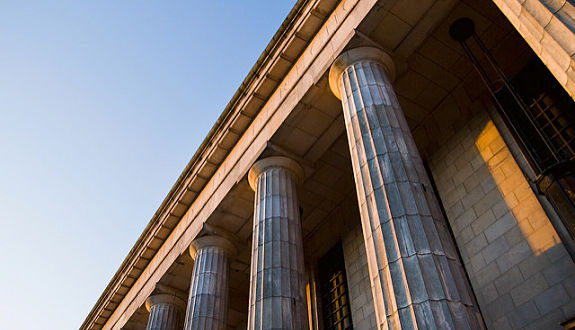
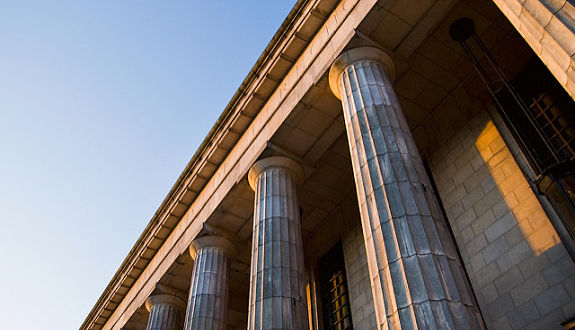
Erica Jansson is excited to be in law school.
Fresh off the June 2017 Law School Admission Test, she just completed her first week at Southwestern Law School in Los Angeles. “The first week has been all about legal writing,” she says, flashing A Lawyer Writes tucked into the crook of her arm.
Erica works as a legal clerk by day, and attends Southwestern’s evening program at night. She’s also the mother of a two-year old and a real life member of the “Trump bump,” the phenomenon legal scholars have been musing about since the president’s travel bans were rejected by courts early in the year.
The so-called bump is a surmised increase in the number of students applying to law school as a result of the recent valorization of the legal sphere. From immigration lawyers working for free at airports around the country to help refugees to federal judges issuing restraining orders to halt the Muslim ban, the profession is enjoying a boost in reputation.
“I’m going to law school because the judicial branch seems to be the final front against the injustices that we’re currently facing,” Erica says. “I want my daughter to grow up in a more loving and accepting country.”
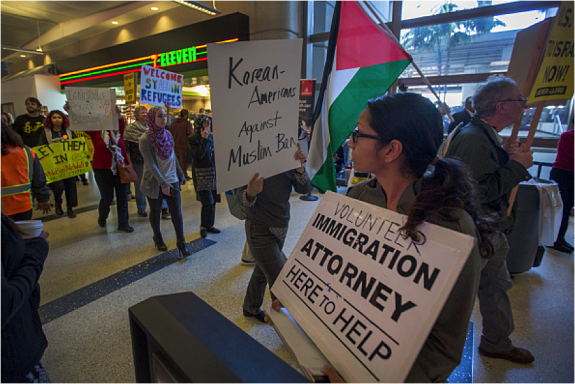
An immigration lawyer looks on during a demonstration at Tom Bradley International Airport in Los Angeles. Photo by David McNew/Getty Images
Erica is part of the nearly 28,000 students who took the June 2017 LSAT. This most recent administration of the test saw the single largest percentage increase of LSAT takers — nearly 20% — in the last eight years.
A history of decline
From 2010-2015, the number of students taking the LSAT to go to law school has steadily declined. The numbers picked up slightly in 2015/16 and 2016/17, but the overall number of test takers was still 60,000 less than the high water mark of 171,514 in 2009/10.
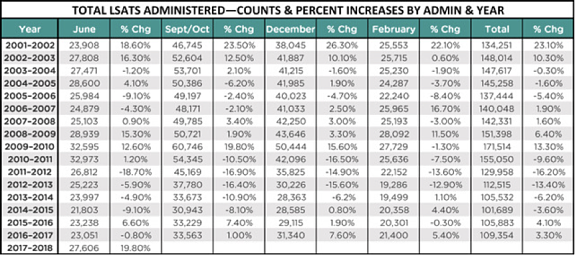
Source: https://www.lsac.org/lsacresources/data/lsats-administered
Until now, that is.
Between Trump’s travel bans, the recent spate of white nationalist marches, the furor over confederate monuments, and the recent pardon of Joe Arpaio, among other events, it seems clear that the country is in a tumult. Many look to the legal sphere as a force to help impose order on the chaos.
Dean Emeritus Joseph Harbaugh of Nova Southeastern University College of Law recalls: “In the late 60s and early 70s, applications to law school spiked as young people were inspired by the Anti-War and Civil Rights movements to seek justice.”
It seems something similar might be happening now. However, it has been difficult to verify the phenomenon from a quantitative standpoint. Part of this is because law schools won’t see the majority of application numbers based on events of 2017 until the 2018 enrollment cycle. However, as an LSAT prep company, we realized we were in a unique position to quantify what’s happening with prospective law students now. So we polled the thousands of June and September 2017 LSAT students in our courses to find out their motivations to attend law school.
The responses were astonishing
Of those polled, over 52% of respondents attributed recent events, such as the Charlottesville protests, as “moderately influential” to “very influential” in deciding what type of law they’d like to pursue.
Similarly, over 52% listed the Trump presidency as “moderately influential” to “very influential” in their decision to apply to law school.
Finally, when ranking in order of importance the factors that explained why they wanted to become lawyers, students listed “As a response to the current political climate/Trump administration” as third overall out of all possible responses. “Prestigious career” and “high salary” were first and second, respectively.
Even more staggering, however, was that 24% of students polled ranked “As a response to the current political climate/Trump administration” first of six possible answers. Only “Prestigious career” was ranked first by more people.
This last statistic is particularly telling. Prestige is a compelling reason for many people when choosing any career, not just the law. However, aside from this, it is the presidency, the presidency, which constitutes the single highest ranked factor in students’ decisions to apply to law school. If you don’t find that astonishing, ask yourself if such a phenomenon would have occurred under the Bush or Obama terms of office.
So according to our data, the Trump bump is officially a real phenomenon.
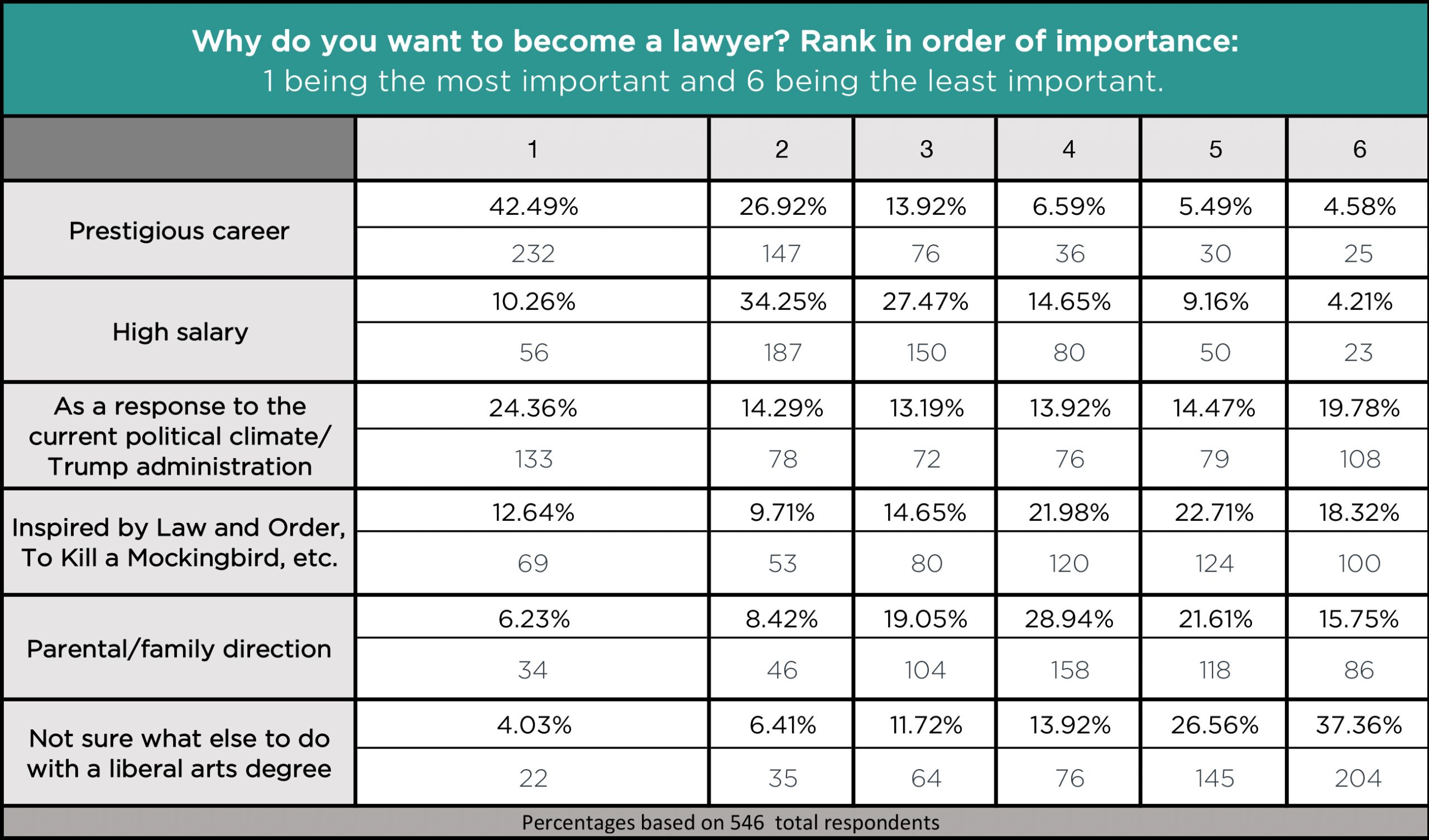
Source: http://blueprintlsat.com/2017-survey/
For the full survey, go to http://blueprintlsat.com/2017-survey/.
But is the bump a good thing?
Part of the reason that the number of students taking the LSAT and applying to law school has flatlined since 2009/2010 is due to a legal job market that hasn’t fully recovered from the Great Recession. Although “Big Law” firms (those employing 250 or more) in major markets recently upped first year associate salaries to $180,000, the boost hasn’t trickled down to all legal jobs.
In fact, the National Association for Law Placement (NALP) reported in June of this year that the overall median first-year salary was the same as for 2015. However, these statistics hinge on traditional associate-level positions in Big Law firms (70% of respondents for the 2017 survey were from firms with 251+ lawyers).
Not only have salaries not increased appreciably, there are more lawyers vying for firm jobs than there are positions available. NALP explains that “following the Great Recession, the number of entry-level Big Law jobs collapsed. Since then, the number…has risen…but for the class of 2015 there were still more than 1,800 fewer entry-level jobs in large law firms than were there for the Class of 2008.”
With Big Law firm jobs still sluggish, the question becomes: What do the prospects look like for lawyers who are going to law school as members of the Trump bump?
Southwestern Law Professor Michael Dorff explains what types of law such students might practice: “I can imagine such students going into careers in immigration law, environmental law, civil rights law, or even tax law. Those are all areas where President Trump has expressed interest in changing the rules, so they are all areas where legal knowledge would be helpful to those who want to resist those changes.”
Is there a place for students searching for such jobs?
As with the rest of the legal sphere, it appears that public interest jobs — the most applicable category for our Trump bump graduates that NALP tracks — are flattening. According to NALP, “With the ABA creating disincentives for law schools to fund graduate jobs, that number has fallen off…and will likely continue to fall further.”
So although the current political climate might have reinvigorated interest in the legal sphere, the job prospects of those going to law school do not appear to be concomitantly elevated. However, those in the legal profession have noted that students who enter the profession because of a specific desire tend to fare better.
Joseph Harbaugh explains, “I’m not sure whether today’s students are applying to law school as a reaction to the political climate and the Trump administration. But if so, it bodes well for their performance. Students who have a specific reason for attending law school tend to do better in class and are highly motivated to seek meaningful professional employment upon graduation.”
Former Dean of Admissions at the University of Chicago School of Law and CEO of Ivey Consulting, Anna Ivey, concurs: “In this job market for law school graduates, you need to know why you’re going more than ever. Going to law school to find yourself and figure it out when you get there is not a winning formula. You have to hit the ground running from day one.”
Despite the stagnant job market, the silver lining in the Trump bump is that it may be attracting students truly interested in the law, making them better law students, lawyers, and, ultimately, citizens in a democracy that rests on a fundamental system of checks and balances.
As for Erica Jansson, she’s turning in her next homework assignment on Thursday. “This week my first brief is due. In four years I hope to be filing a real one on behalf of a disenfranchised immigrant, child, or citizen. At the end of the day, I’m in law school because this is the way I know I can make a difference.”
In these unsettled times, the hope is that she, and the others like her in law school, will do precisely that.
Search the Blog

Free LSAT Practice Account
Sign up for a free Blueprint LSAT account and get access to a free trial of the Self-Paced Course and a free practice LSAT with a detailed score report, mind-blowing analytics, and explanatory videos.
Learn More
Popular Posts
-
logic games Game Over: LSAC Says Farewell to Logic Games
-
General LSAT Advice How to Get a 180 on the LSAT
-
Entertainment Revisiting Elle's LSAT Journey from Legally Blonde








